The assassination of Kandahar’s progressive mayor, Ghulam Haider Hamidi, this week marked the latest in a wave of high-profile killings in Afghanistan, reviving the debate over whether the Taliban is orchestrating a coordinated offensive ahead of America’s troop drawdown. Taliban leaders were quick to claim credit for Hamidi’s death, along with that of Afghan President Hamid Karzai’s half-brother Ahmed Wali Karzai on July 12. However, top American officials in the war-torn country, along with one strategic insider who worked closely with Hamidi, are hesitant to verify the Taliban’s claims. “Whether Hamidi’s killing was really orchestrated by the Taliban is difficult […]
Diplomacy & Politics Archive
Free Newsletter
Earlier this month, a clash between Iranian soldiers and Azerbaijani border guards left one Azerbaijani guard dead. In an email interview, Brenda Shaffer, a senior lecturer at the University of Haifa and a visiting professor at the Azerbaijan Diplomatic Academy, discussed Iran-Azerbaijan relations. WPR: What has been the trajectory of Iran-Azerbaijan relations over the past 10 years? Brenda Shaffer: Iran’s policy toward Azerbaijan is one of the best illustrations of the gap between Tehran’s ideological declarations and its actual realpolitik-guided policies. Despite sharing a common Shiite identity with Azerbaijan, Tehran has worked to undermine Azerbaijan’s security since the latter’s independence. […]
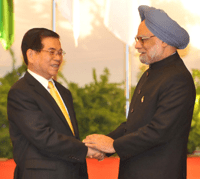
Even as Vietnam and China continue to conduct tit-for-tat naval maneuvers in the South China Sea, Hanoi has started making direct calls for foreign involvement in the two nations’ maritime territorial dispute. While many commentators saw this as a thinly veiled invitation to the United States, it could also be a precursor to India establishing a permanent presence in Vietnamese waters. India has apparently responded favorably to Vietnam’s offer of permanent berthing rights in Na Thrang port. The move would not only add military heft to India’s “Look East” policy, but is also emblematic of a larger Indian effort to […]

Is it time for NATO to begin wrapping up its Libya operation? The observance of Ramadan will begin in a few days, and even though Islamic tradition permits those involved in combat to be exempted from the requirements of the fast, most analysts expect a dramatic slowdown in major combat operations on the part of both pro-Gadhafi and anti-government forces during August. While NATO spokesmen have indicated that sorties will continue to be flown during the holiday, the pace of combat will lessen. This, in turn, may reinforce conditions on the ground, which Chairman of the Joint Chiefs of Staff […]
The crackdown on opposition protesters by Malawi’s democratically elected government led to the deaths of 19 people last week and triggered the U.S. suspension of a prized $350 million development grant to the tiny sub-Saharan African nation. According to Kim Yi Dionne, a political scientist at Texas A&M University and former Fulbright Scholar in Malawi, the U.S. held off in announcing the suspension until this week in hopes that Malawian President Bingu wa Mutharika might condemn the crackdown. “The U.S. probably waited to see if he didn’t order the police to shoot people,” Dionne told Trend Lines yesterday. “They didn’t […]
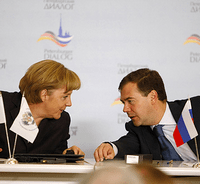
Coming on the heels of Berlin’s decision to phase out nuclear power, the recently signed memorandum of understanding between German utility RWE and Russia’s state-owned Gazprom to negotiate a joint venture on downstream gas and power plants could spell bad news for Europe on three levels. First, if it bears fruit, the partnership will undermine European diversification efforts, since RWE was the leading utility behind the European Union’s Nabucco pipeline designed to tap new Central Asian supplies. Second, it will bolster oil-indexed pricing schemes against the impact of wholesale spot prices, serving to keep prices on an “artificial” footing. Third, […]
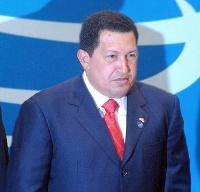
Few political leaders in power today have harnessed the power of the media as effectively — and as personally — as Venezuelan President Hugo Chávez. From the moment he took office, Chávez deployed himself across existing platforms, using every available communications resource to present himself, his ideology and his policies directly to the public. Now, as his idiosyncratic rule runs up against limitations imposed by serious health problems, Chávez has found that the latest in modern communications technology, social media, is a most useful tool. Chávez is becoming the Twitter President, issuing a continuous stream of 140-character opinions and dictates […]
The United Nation’s declaration of a famine in two regions of southern Somalia has been accompanied by horrific reports of starvation and news of more than 100,000 internally displaced people flooding into Mogadishu. Already bearing the burden of a 20-year-old civil war, the Somali capital now appears to be emerging as the epicenter of the famine’s misery as well. However, the exodus of starving Somalis may also have volatile regional ramifications, specifically in neighboring Ethiopia and Kenya, says Elizabeth G. Ferris, codirector of the Brookings-LSE Project on Internal Displacement in Washington. Ferris reminded Trend Lines yesterday that Kenya is already […]

BEIJING — Since 2009, China’s credit-fueled economic stimulus plan has dramatically increased overall indebtedness and created new risks to long-term headline growth. Among the most acute of these is mounting local government debt, which has tripled as a percentage of GDP since 2008 amid a carnival of inefficient spending. Clearing up the mess has emerged as a key challenge for maintaining strong economic growth. However, the solution is as much political as economic and requires a fundamental rebalancing of the power relations between central and local government. Compared to most developed economies, China’s national debt levels remain low at around […]
Earlier this month, U.N.-led negotiations between Cyprus and Turkish Cyprus on the status of the divided island ended without any significant breakthroughs. In an email interview, Michális S. Michael, deputy director of the Center for Dialogue at La Trobe University, discussed the Cyprus talks. WPR: What are the primary areas of progress in talks between Cyprus and Turkish Cyprus, and how do they compare with the final status of talks in 2004? Michális S. Michael: In contrast to 2004, and despite 126 high-level meetings since 2008, little progress has been achieved on the core issues separating the two sides. While […]

As the father of 2-year-old twin daughters, I often find myself thinking about how international politics and foreign policy will play out across their lives. Of course, parents aren’t the only “institutions” that wonder about the possibility of forecasting and shaping the future. Governments, international organizations and companies make huge investments of both lives and money based on expectations with time horizons of 10, 20 and even 50 years. Nimitz-class aircraft carriers have been in service for more than 30 years and may serve for another 40. The United States is currently wrestling, in a very public manner, with the […]
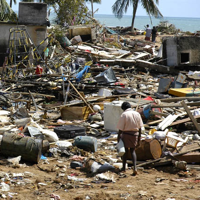
On Dec. 26, 2004, a massive earthquake shook Aceh, Indonesia, sending tsunamis racing across the Indian Ocean to shatter communities as far away as Somalia. Many of the countries struck by the destructive waves were embroiled in major, often-violent, political conflicts at the time. Indonesia’s Aceh province and Sri Lanka, the two worst-hit locations, had each experienced a decades-long internal conflict that had taken thousands of lives. At the time, many wondered whether the tsunami disaster would affect the conflicts, potentially bringing peace. Would violent means be set aside to achieve a common humanitarian purpose of helping people and communities […]
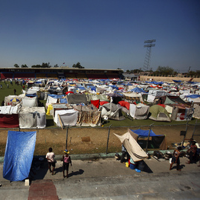
Over the past several decades, responses to major disasters have become an important responsibility of the international community. In that time, the global disaster-response system has evolved to cope with the increased human and material consequences of geophysical events. Nevertheless, shortcomings of the current system have become increasingly apparent and must be addressed in order to strengthen it. Much of the discussion of how to do so contrasts centralized global solutions with decentralized regional solutions. To get a better idea of the relative merits of both approaches, it is necessary first to understand the key components and overall architecture of […]
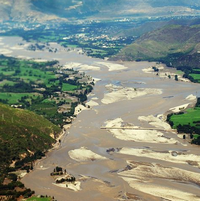
When historians come to write the history of the European Union in the period following the ratification of the Lisbon Treaty in 2009, they are likely to describe it as a litany of jarring crises. They will naturally prioritize the financial shocks to the eurozone in 2010 and 2011. But they will also have to make space for at least two major humanitarian crises that sparked angry debates about the EU’s global role. The first was the earthquake that hit Haiti in January 2010. The second was the man-made disaster in Libya that began in February 2011. The Haitian catastrophe […]
